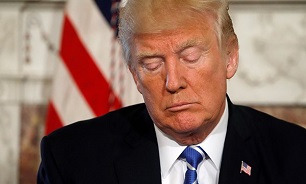US Ex-Military Chief Warns US, North Korea Closer to Nuclear War than Ever
 Mullen told ABC News on Sunday that resolving the standoff between Washington and Pyongyang through diplomacy was not going to be an easy job.
Mullen told ABC News on Sunday that resolving the standoff between Washington and Pyongyang through diplomacy was not going to be an easy job.
“We’re actually closer, in my view, to a nuclear war with North Korea and in that region than we have ever been,” he stressed, underlining that “I don’t see the opportunities to solve this diplomatically at this particular point.”
He also attributed the rising danger to US President Donald Trump’s “incredibly disruptive” presidency.
“And in my view, an incredibly dangerous climate exists out there in that uncertainty with how this all ends up,” he said, adding that “One in particular that is top of the list is North Korea.”
Mullen said the future of the conflict depended largely on China’s actions as North Korea’s closest ally, which has been under pressure from Trump to increase economic pressure on Pyongyang.
“Well I think President Trump has made China move more than they have in the past. Whether they will continue to do that, to help resolve this, is the open question,” Mullen added, underscoring that “And I think a real measure of how this all comes out is whether China is going to commit to a peaceful resolution here.”
The UN Security Council unanimously imposed a new round of sanctions on North Korea on Friday, following its latest ballistic missile test launch in late November. Pyongyang is already under an extremely harsh economic sanctions regime, but the latest round further slashed its refined petroleum product imports and banned all remaining major exports. The measure also demands the repatriation of all North Koreans working abroad within 24 months.
North Korea announced that Pyongyang considers the latest round of UN sanctions, which severely crippled its remaining imports and exports, to be an “act of war”.
Washington’s decades-long military presence in and around the Korean Peninsula has forced Pyongyang to develop its ballistic missiles and nuclear weapons as a deterrent against Washington's aggression.
Pyongyang has fired a ballistic missile which splashed down in the Sea of Japan. North Korean leader personally oversaw the launch of the ICBM, which Pyongyang claims is a Hwasong-15, tipped with super-large heavy warhead and capable of hitting the whole mainland of the US.
Tensions have been building on the peninsula following a series of nuclear and missile tests by Pyongyang as well as threats of war and personal insults traded between US President Donald Trump and the North Korean leader Kim Jong-un.
Trump and Kim have exchanged a series of personal insults, with Trump calling Kim a "little rocket man" and "mad man" and Pyongyang calling the US president a "mentally deranged dotard" and "old lunatic".
In 2017, North Korea carried out 20 ballistic missile launches, while the United States and its allies, for their part, are constantly conducting far-reaching sea drills in the region. The parties are exchanging tough rhetoric and admit that any scenario - including military action - is possible.
Pyongyang had a busy time developing its nuclear and ballistic programs over the course of 2017, having staged 16 missile tests and conducting its sixth and most powerful nuclear test.
North Korea has been under a raft of crippling United Nations sanctions since 2006 over its nuclear tests as well as multiple rocket and missile launches.
Pyongyang has firmly defended its military program as a deterrent against the hostile policies of the US and its regional allies, including South Korea and Japan.
US President has vowed to impose additional "major sanctions" against North Korea, while Washington has thousands of troops in the region, partially in South Korea and Japan, and routinely threatens the North with military action to stop its weapons program.
Washington, Tokyo and Seoul have held a series of high-profile war games near the Korean Peninsula over the past months, amid an ongoing standoff over Pyongyang's development of ballistic missiles and nuclear warheads, as both South Korea and Japan – despite tense relations amid disputes over history and territory – are allies and look to the US for their security.
North Korean officials have time and again accused their American counterparts of seeking regime change in their country.
